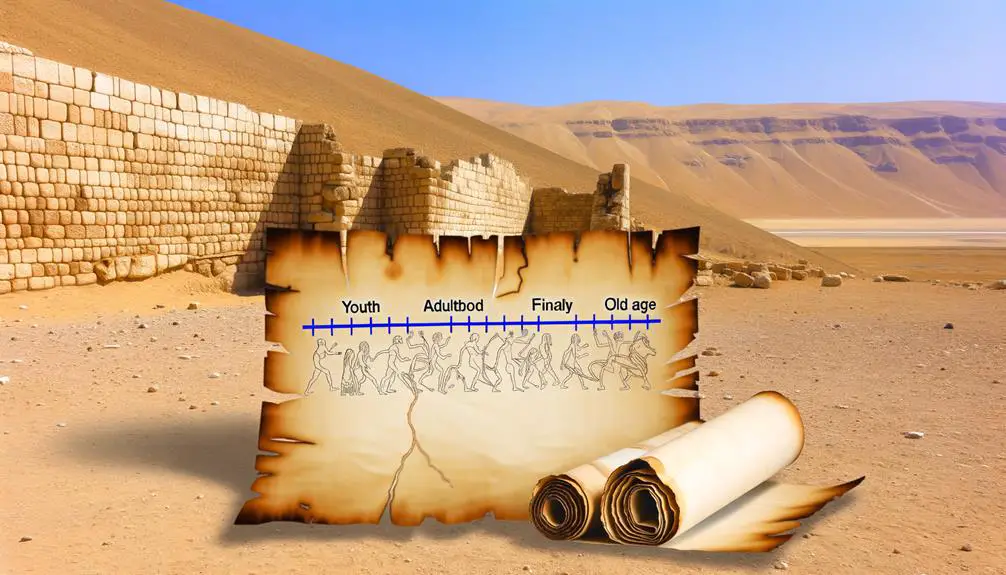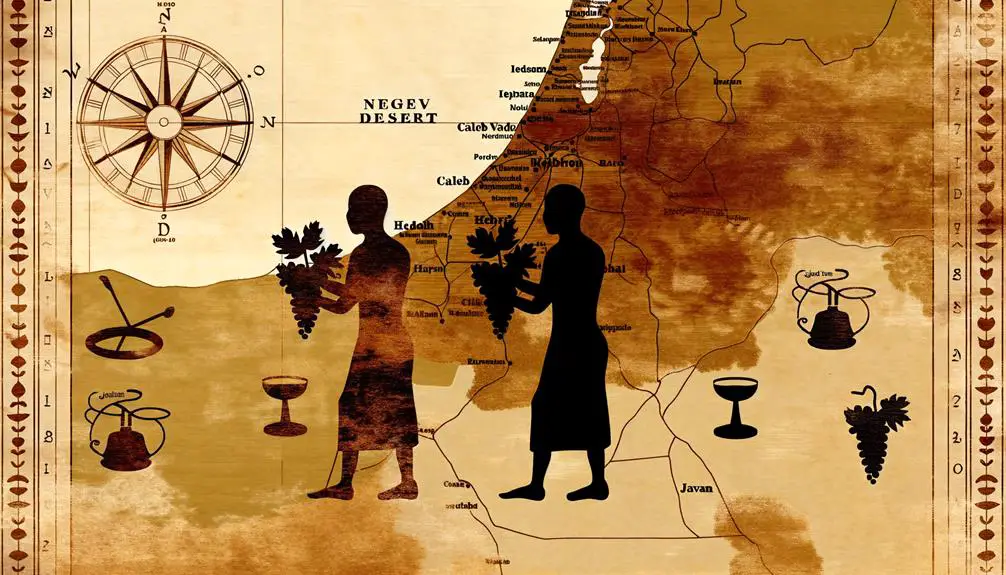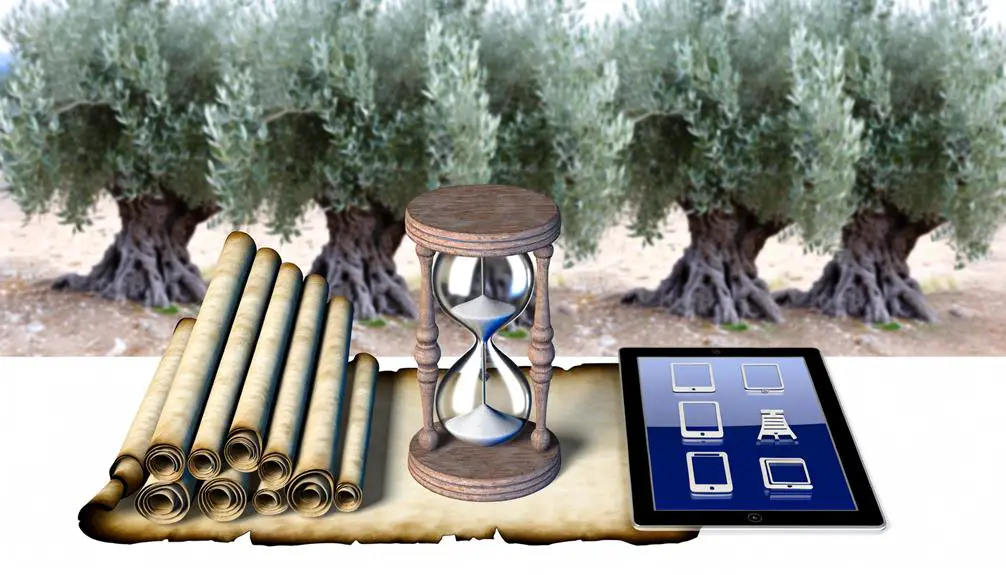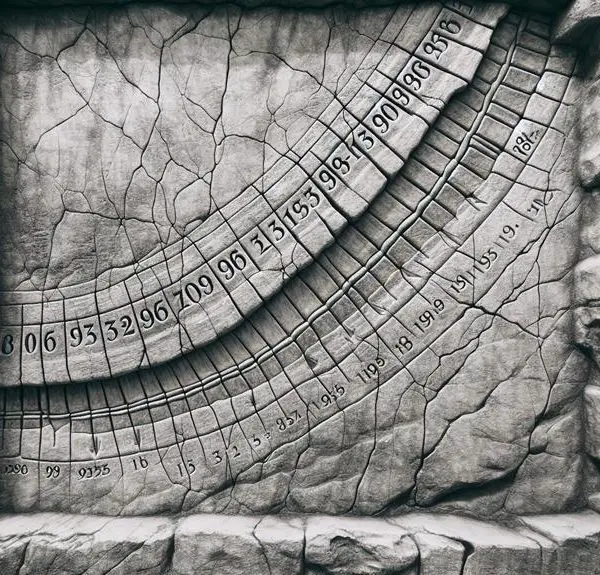Unlock the mystery of Caleb's biblical lifespan and discover how ancient faith and longevity intertwine in this intriguing scriptural exploration.

How Long Did Caleb Live in the Bible
Imagine you're tracing your family tree and stumble upon an ancestor whose age seems to stretch far beyond the norm, sparking curiosity and disbelief.
Similarly, the biblical figure Caleb's lifespan has intrigued scholars and believers alike for generations. The Scriptures offer clues, but piecing together the evidence to ascertain how long he lived requires a keen eye for detail and an understanding of ancient contexts.
As you explore Caleb's journey, consider how his age reflects not just on his physical vitality but also on his spiritual legacy. This exploration may challenge your perceptions of longevity and faith in the ancient world.
Key Takeaways
- Caleb was 40 years old during the spy mission and 85 when he requested to conquer Hebron.
- The Bible does not explicitly state Caleb's age at death.
- Caleb's exceptional physical and mental vitality at 85 highlights his remarkable longevity.
- His life, marked by faith and courage, suggests a lifespan beyond typical expectations of his era.
Unveiling Caleb's Age

Determining Caleb's age in the Bible involves piecing together various scriptural references, offering a glimpse into his enduring faith and remarkable longevity. You'll find that Caleb's age isn't directly stated, leading to a fascinating age debate among scholars and theologians. This debate isn't just a matter of numbers; it's deeply entwined with interpretations of Caleb's vitality and the historical context of his time.
Caleb's vitality is a key aspect of this discussion. Despite the lack of explicit information about his exact age at certain events, descriptions of his physical strength and mental acuity at advanced ages are prominent. These accounts fuel the debate, as they suggest a man whose age didn't diminish his capacity for leadership or diminish his spirit for adventure. His request to conquer Hebron at the age of 85, as he claimed to be as strong as he was 45 years earlier, is a testament to his remarkable vigor.
The age debate around Caleb isn't just academic; it touches on themes of faithfulness, divine blessing, and the human condition in the face of aging. Analyzing Caleb's age requires a respectful approach, recognizing the limitations of the textual evidence while appreciating the broader narrative arc of his life. His story isn't just about numbers but about the qualities that defined him: resilience, faith, and an unyielding determination to follow through on God's promises. In your journey to unveil Caleb's age, you're not just piecing together a timeline; you're exploring the depths of a life lived fully, guided by faith and an indomitable spirit.
Scriptural Evidence

To understand Caleb's age, we turn to scriptural evidence that offers insights into his life's timeline and the epochs he navigated with unwavering faith. The biblical narrative meticulously documents Caleb's lineage and pivotal moments, shedding light on the longevity and significance of his journey. Yet, interpreting his exact age involves navigating through age discrepancies that arise from various scriptural accounts.
Caleb's lineage, as outlined in the Bible, places him as a representative of the tribe of Judah during the spy mission into Canaan. This pivotal role underscores his prominence and the trust vested in him. However, when you delve into the numbers, you encounter the first layer of age discrepancies. The Bible mentions Caleb being 40 years old when he was sent as a spy, as recorded in the Book of Numbers. Later, it references him being 85 years old when he asks Joshua for the land of Hebron, a testament to his enduring strength and faith.
These references are crucial in piecing together Caleb's life span, yet they also leave room for interpretation. The gap between these events and the lack of specific birth and death dates contribute to the age discrepancies encountered in scriptural analysis. Despite these challenges, the evidence presented through Caleb's lineage and the significant markers of his life allow for a respectful and informed analysis of his age. Understanding these scriptural nuances is essential in appreciating Caleb's enduring legacy in biblical history.
Historical Context

After examining the scriptural evidence of Caleb's age, it's essential to consider the historical context that shaped his era and its relevance to his narrative. Caleb lived during a period marked by the Canaan conquest and the tribal allocation of the Promised Land. This era was not just about battles and land division; it was about the fulfillment of divine promises and the establishment of a covenant community.
The conquest of Canaan was a pivotal event that demonstrated the Israelites' faith and obedience to God's commands. Caleb, as one of the two faithful spies, played a significant role in this phase, showcasing remarkable faith in God's promise despite the daunting challenges ahead. His unwavering trust set a precedent for future generations.
Tribal allocation was another critical aspect of this period. After the conquest, the land was divided among the twelve tribes of Israel, establishing their inheritance and territorial boundaries. This process was not merely administrative; it was a fulfillment of God's promises to the patriarchs.
To emphasize the significance of Caleb's era, consider the following table:
Aspect |
Relevance |
|---|---|
Canaan Conquest |
Demonstrated faith and obedience |
Caleb's Role |
Showcased unwavering trust in God |
Tribal Allocation |
Fulfilled divine promises |
Covenant Community |
Established a new social and spiritual order |
Understanding this historical context enriches the narrative of Caleb's life. It wasn't just about how long he lived but about the era he influenced and the legacy within the broader story of Israel's formation and settlement in the Promised Land.
Caleb's Legacy

Caleb's legacy extends beyond his lifetime, shaping the faith and resilience of subsequent generations within the Israelite community. His story isn't just a historical account; it's a testament to what it means to live a life of unwavering faith and courage. Caleb's courage wasn't a fleeting moment of bravery but a sustained testament to his deep, abiding faith. This wasn't about blind optimism but a conviction in the promises made by God to his people.
You might wonder why Caleb's story matters today. It's because his life serves as a powerful example of faith's impact on personal and communal resilience. In moments of doubt and trial, Caleb's unwavering belief in God's promises provided a beacon of hope. His legacy isn't just about the land he was promised but about the spirit of perseverance and faith he exemplified.
Caleb's courage and faith didn't merely benefit him; they inspired those around him and set a precedent for future generations. His life reminds us that faith isn't passive but active. It challenges, moves, and sometimes, it even conquers. Caleb's story encourages you to face your own giants, not with fear, but with the conviction that faith can bring down even the mightiest obstacles.
In essence, Caleb's legacy is a call to action. It's a reminder that faith's impact isn't just about what you believe but how those beliefs shape your actions, resilience, and the community around you. Through his example, you're encouraged to live a life marked by courage, guided by faith, and unwavering in the face of challenges.
Modern Interpretations

Modern interpretations of Caleb's story highlight its enduring relevance in contemporary discussions on faith and perseverance. When you delve into the narrative of Caleb, it's not just an ancient tale you're exploring but a rich source of inspiration that speaks volumes to today's world. His journey, marked by unwavering faith and steadfastness, continues to resonate, sparking theological debates and underscoring its cultural significance.
You'll find that Caleb's story serves as a fertile ground for discussions on the nature of faith. It's fascinating to see how theologians and scholars dissect his actions and decisions, often using them as a benchmark for what it means to truly trust in divine promises. This isn't just about historical curiosity; it's about understanding the dynamics of faith in the face of adversity, a topic as relevant now as it was thousands of years ago.
Moreover, Caleb's narrative has woven its way into the fabric of cultural significance, offering a lens through which one can examine the virtues of age, wisdom, and the rewards of a life lived with integrity. It's not uncommon to see his story cited in modern sermons, books, and even in everyday conversations as an exemplar of how perseverance and faith can lead to fulfillment and divine favor.
What's particularly striking is how Caleb's story invites you to engage in theological debates, challenging you to reflect on your own beliefs and values. It's a testament to the story's depth and its ability to foster a deeper understanding of spiritual truths, making it a timeless tale that continues to inspire and challenge.
Frequently Asked Questions
How Did Caleb's Faith and Actions Influence His Family and Descendants?
Caleb's unwavering faith and bold actions significantly shaped his family legacy, instilling a sense of generational faith. By wholeheartedly following God and demonstrating courage, he set a powerful example for his descendants.
This legacy of faith and determination didn't just impact his immediate family but also inspired future generations to trust in God and stand firm in their beliefs, showcasing the lasting influence one person's faith can have on their lineage.
What Were the Specific Challenges and Battles Caleb Faced After the Israelites Entered the Promised Land?
Interestingly, your focus on Caleb's post-entry challenges coincides with a deeper exploration of his journey. Caleb's inheritance wasn't just land; it was a series of battles, notably against formidable giants. His victories weren't mere conquests; they were a testament to his faith and resilience.
Analyzing these feats, you'll find Caleb's experiences weren't just about territory but about overcoming obstacles that seemed insurmountable, thereby securing a legacy of strength and faith for his descendants.
How Did Caleb's Relationship With Joshua Shape the Course of Israelite History?
Caleb's relationship with Joshua significantly influenced Israelite history. Their unified stance under Joshua's leadership bolstered Israelite unity, navigating challenges with a shared vision.
This partnership exemplified trust and cooperation, setting a precedent for future leaders. Their collaborative efforts not only secured territories but also cemented a legacy of leadership that prioritized collective well-being over individual gain, shaping the course of Israelite history through a lens of solidarity and resilience.
Are There Any Archaeological Findings or Artifacts That Have Been Linked to Caleb or His Era?
You're curious if there are ancient inscriptions or artifacts tied to Caleb or his era. While direct evidence linking to Caleb is scarce, archaeological findings from his time offer insights into the cultural implications of that period.
These artifacts help us understand the broader historical context, shedding light on the societal norms and practices.
It's a fascinating journey, piecing together history from the clues left behind by our ancestors.
How Has Caleb's Story Been Depicted or Referenced in Contemporary Literature, Art, or Media Outside Traditional Biblical Interpretations?
Caleb's story, practically leaping from the pages of history, has found its way into modern adaptations, leaving a significant mark. Artistic representations of his tale, spanning from classical paintings to contemporary novels and films, showcase the depth of his character.
These interpretations, far beyond mere biblical recountings, analyze his legacy with nuance and respect. They reflect society's evolving understanding of faith, courage, and the human spirit, enriching our cultural tapestry.
Conclusion
In wrapping up, Caleb's story in the Bible, like an ancient tree, has roots that delve deep into faith and determination. Scripture and historical context suggest he lived to be around 85 years old, a testament not just to his longevity but to the indomitable spirit he embodied.
His legacy, interpreted through modern lenses, continues to inspire and challenge us. Caleb's life is a beacon, illuminating the path of steadfast faith and unwavering courage in the face of adversity.



Sign up